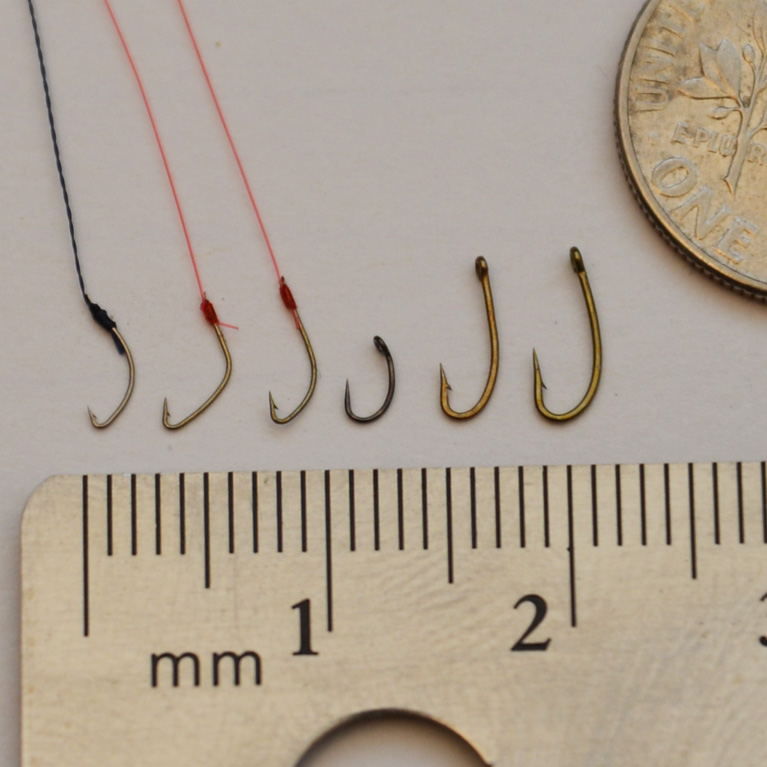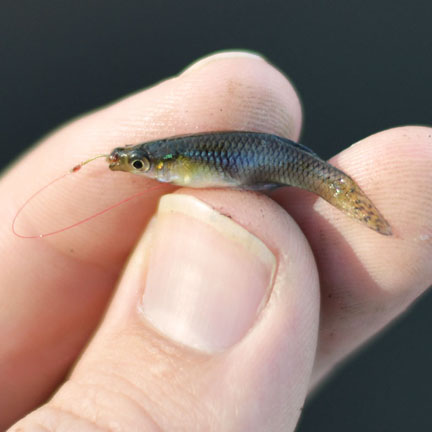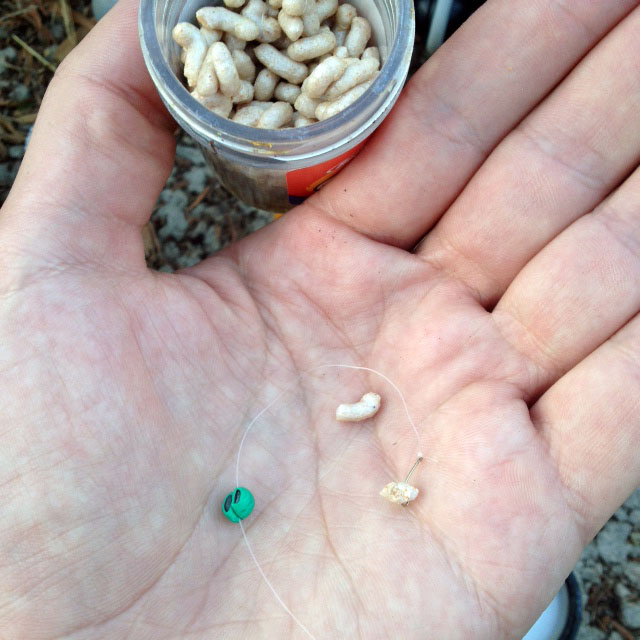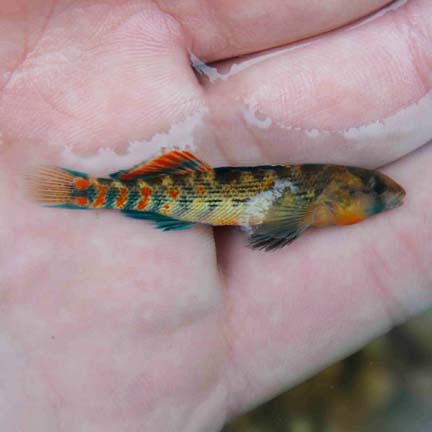Outfitting for micro fishing requires creativity since the local Bass Pro and Cabelas have yet to offer specific tackle. You will need to modify tackle used for other purposes. The best places to begin searching for equipment is in the ice fishing and fly fishing department.

Gamakatsu “Ultimate” snelled, Owner “Smallest” snelled, Owner ” New Half Moon” snelled, size 30 midge barbless, Umpqua size 24, Tiempco 22 (left to right).
Hooks for Micro Fishing
The most important reason you should use small hooks for micro fishing is so you can successfully release micro fish back into the water with the least amount of damage. Barbless hooks lessen damage to the fish, however; this can be frustrating because of the difficulty in landing hooked fish. Some people use micro fishing for catching bait fish. This should not be done unless you are familiar with the fish you are catching and only keep the common species. Fly fishing tackle is a good place to look for small hooks and line. Find the smallest hook available. Anything below size 14 is a good. Ideally, the hook will be in the 20 and 30 range. Choosing pre tied, or snelled, hooks can save time and frustration. Also, look for hooks with a longer shank as these are easier to remove from the mouth of the fish. Japanese hooks, such as those used for catching tanago, a species of bitterling, are an ideal choice.
- Tanago snelled hooks and Nymph fly hooks on Amazon
- Hooks for sale at Tenkarabum
Line, Bobbers and Floats
Line should be extremely light since most small fish have great eyesight and will not bite if they are spooked. Again, start by looking for line in the fly fishing tackle section. Find a high quality small diameter tippet. An alternative is ice fishing line. However, this is usually weaker and has a larger diameter for the same pound test. These small lines can be attached as a leader on to a spinning rod. A very small weight pinched at about three to five inches above the hook will help control bait and keep the line steady in wind. Japanese equipment that is specialized for tanago can also be used, such as the bitterling kit listed below, and is best in murky conditions
- Fluorocarbon and 7x Frog Hair tippet available at Amazon
- Line indicators at Amazon
- Bitterling kit with hook, line, float, indicators and spool at Amazon
- Colored splitshot and Tube weights at Amazon
Rods for Micro Fishing
Most micro fishing is by sight so use a longer rod that will allow you to sneak up on the fish without scaring them. Several good options are crappie rods and heavier weight fly rods. Both of these options may have disadvantages to be aware of and avoid. Crappie rods (panfish rods) will be your most dependable, available, and affordable option. Some of the lighter weight fly rods have very sensitive tips that will cause the bait to bounce around undesirably in front of the fish. Although far from ideal, a conventional fishing rod and reel can be used by attaching micro fishing gear at the end of the line. Most micro fishing will require a 9-12 foot rod. Longer rods are available and will be excellent options so long as the bait can still be held steady. When using a fly or crappie pole you will tie the line to the furthest ring of the rod leaving between one and five feet of fixed line. Japanese tenkara rods designed for tanago can be excellent micro fishing rods but the best models tend to be expensive and other are short and difficult to use unless on a dock or structure immediately adjacent the water.
- 4.2′ bitterling rod on Amazon
- 10′ panfish pole on Amazon (Affordable choice for micro fishing)
- Tenakara micro rods at Tenkarabum
Bait and Techniques
Worms work great for micro fishing. Many micro fish have very small mouths so the smallest piece of worm you can get on the hook is ideal. Using your finger nail, or clippers, will be your best options for preparing the bait. Maggots, blood worms, and gluten also work for micro fishing. When necessity dictates, a wide variety of other food sources can also work as bait for catching minnows. Some good baits you can purchase at the grocery store are bread, cheese, and imitation crab.
- Berkley Gulp Maggots at Amazon
The depth of the bait in the water is important and will determine what species of fish you will catch. If the bait is teased on the surface of the water you will attract aggressive topminnows and other species that primarily feed at this level. Letting the bait fall to the bed of the pool or stream will entice benthic feeders such as darters and madtom. Time of day, swiftness of current, structures, and substrate are also factors to consider when targeting micro fish. Researching habitats and feeding traits of fish will increase your chances of landing the right species.
- Peterson Field Guide to Freshwater Fishes, Second Edition
- Fish Watching: An Outdoor Guide to Freshwater Fishes
- Small Fry and Bait Fishes (UK)
- The Minnow Family: Chubs, Dace, Minnows, and Shiners
Written by Miciah McNeilus and Bryce Hallock
Below is a list of other products and resources relevant to micro fishing
Organizations
Additional Products







